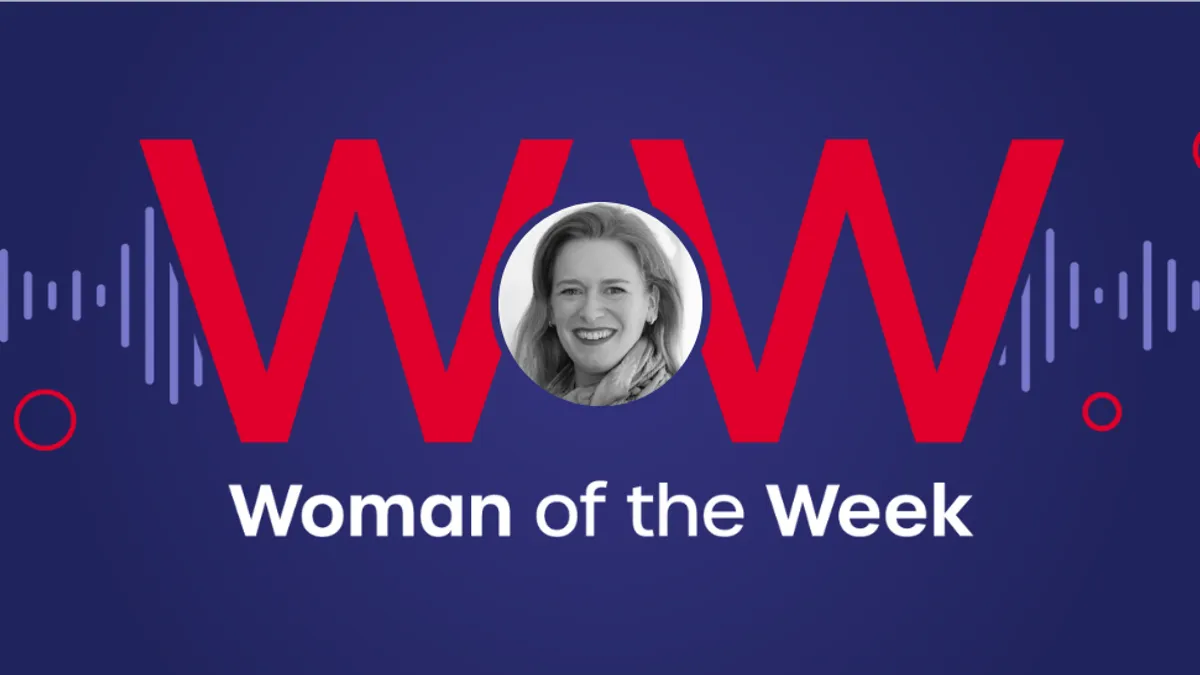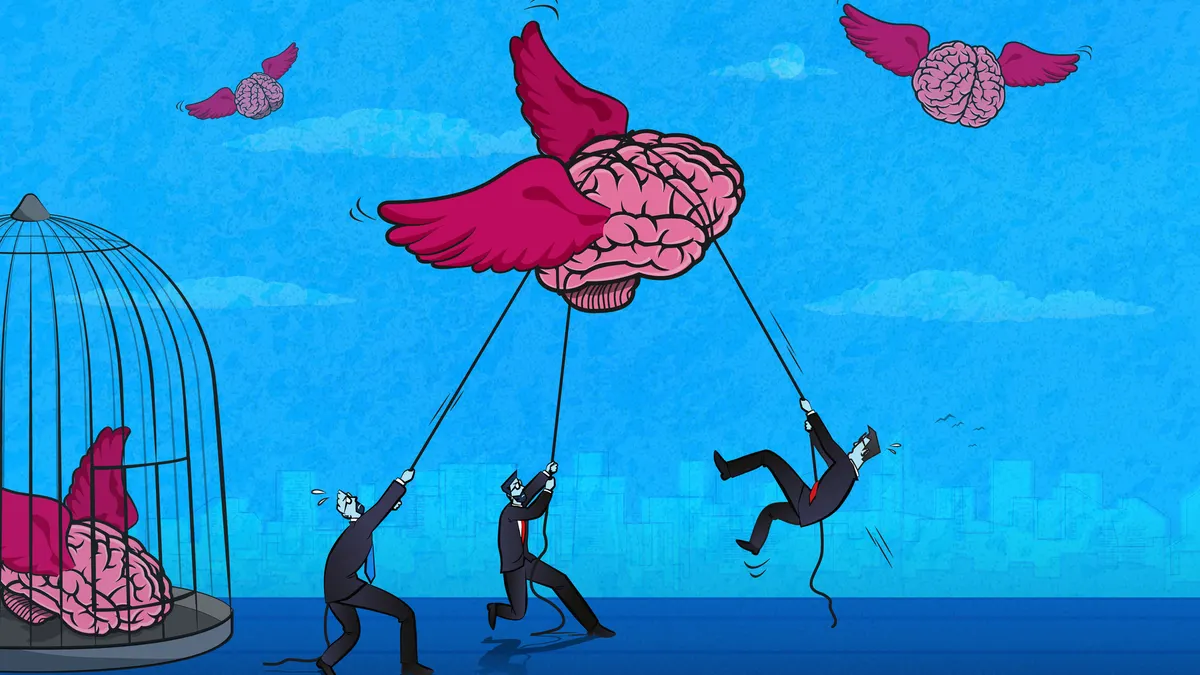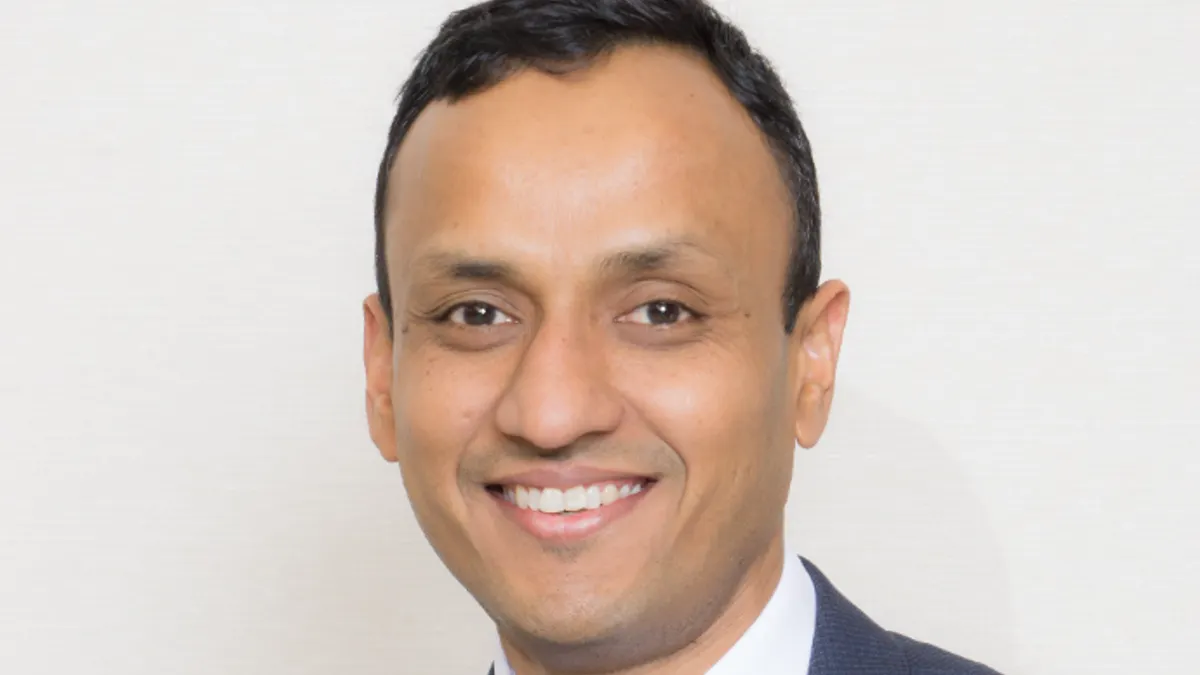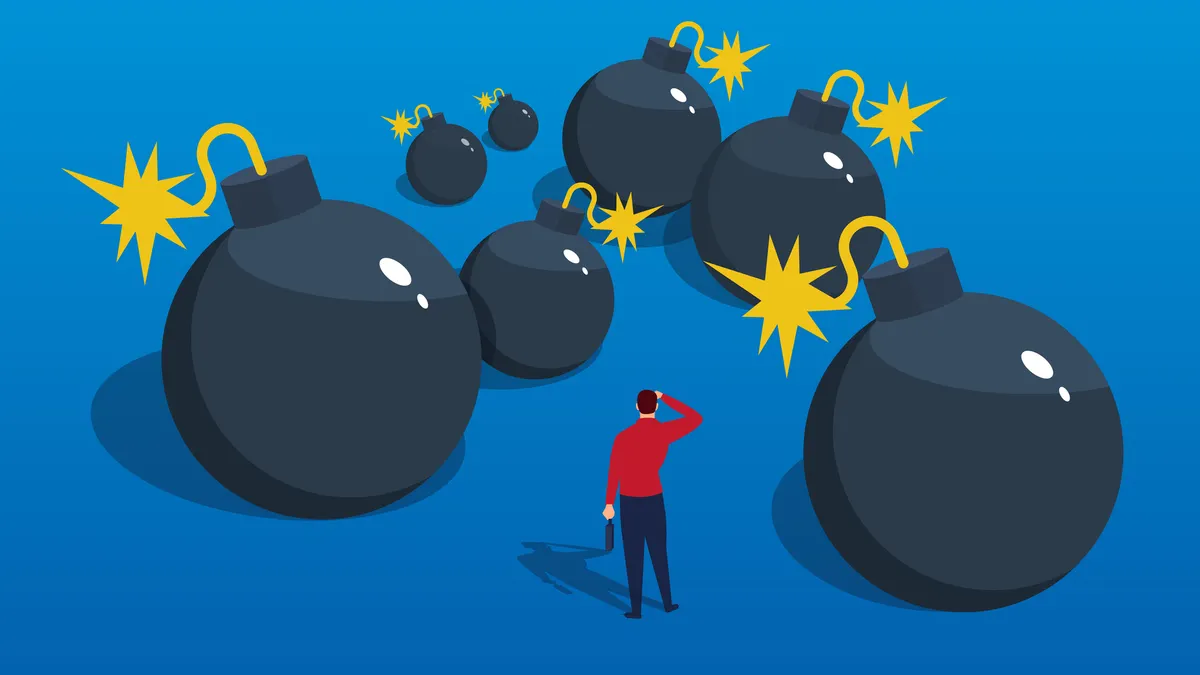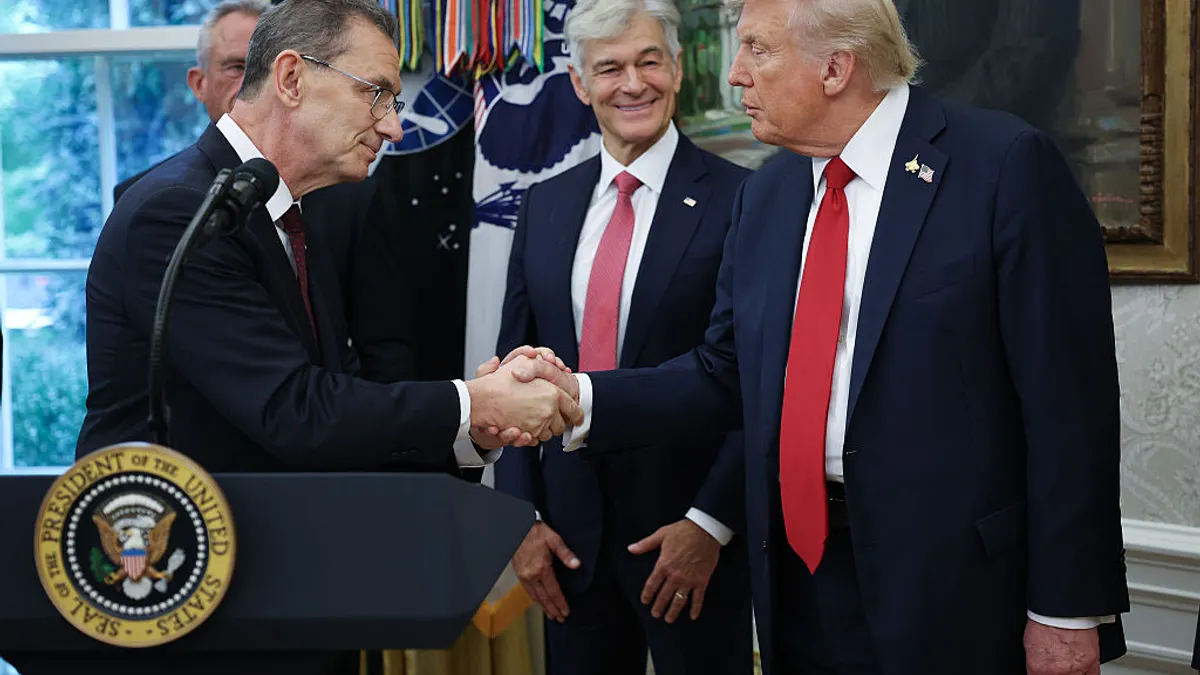Welcome to the Woman of the Week podcast, a weekly discussion that illuminates the unique stories of women leaders who are catalyzing change throughout the life sciences industry. You can check out all our podcast episodes here.
Fiona Elwood’s love affair with the brain extends to her early undergraduate days when she entered the fascinating world of molecular pharmacology.
“Once you start learning about the brain, I don't know how you can move into any other organ in the body,” she said. “This really started my excitement to understand how the brain works, and then how it goes wrong. My Ph.D. was in Alzheimer's disease, and because I wanted to have an impact on patients’ lives and I loved the idea of working in teams with people who had different sets of expertise beyond anything I could ever know about my area, I was inspired to move to industry.”
With nearly 15 years of combined experience at Merck & Co. and Novartis, Elwood made a big leap to join Janssen at the beginning of 2022 as vice president, disease area stronghold lead of neurodegeneration, a role that is unique in the industry but suits Janssen’s approach to focus on the biology of disease and understand the clinical measurements and outcomes for those diseases.
“Essentially, I'm responsible for the science and strategy of neurodegeneration from the very earliest stages,” Elwood said. “What targets are we going to work on? How are we going to understand disease? What are the breakthrough areas and different aspects of neurodegeneration or neurological disorders all the way through to the clinical development programs. How are they going to impact patients? So, it's really from beginning to end. That's one of the strengths of Janssen and one of the things that really led me to this particular opportunity.”
Rather than leading hundreds of team members, Elwood said as a “singular contributor” — a role she is relishing — she is focused on five molecules in clinical development, including nipocalimab, a FcRn receptor being developed for both rare and more common auto-antibody-driven diseases — and an Alzheimer’s program focused on the interplay between tau and amyloid proteins.
In this week’s episode of our Woman of the Week podcast, Elwood delves into the science and strategy behind these two lead programs, lessons learned in becoming a servant leader and her approach to keeping teams buoyed during bad times and good times.
Welcome to WoW, the Women of the Week podcast by PharmaVoice powered by Industry Dive. In this episode, Taren Grom, editor in chief emeritus at PharmaVoice meets with Fiona Elwood, neurodegeneration DAS leader, Janssen.
Taren: Fiona, Welcome to the WoW podcast program. Let's dig in. What does your role as DAS leader of neurodegeneration entail?
Fiona: Thank you. I'm the disease area stronghold leader in neurodegeneration. Essentially that means I'm responsible for the science and strategy of neurodegeneration and some of our neurology programs as well at Janssen.
Taren: How big of a remit is that for you? How many programs do you oversee?
Fiona: I have five molecules in clinical development with some of those molecules having several different programs. Essentially I'm responsible for the science and strategy of neurodegeneration from the very earliest stages. What targets are we going to work on? How are we going to understand disease? What are the breakthrough areas and different aspects of neurodegeneration or neurological disorders all the way through to the clinical development programs. What are the real differentiating points of those programs? How are they going to impact patients? So, it's really from beginning to end. And I think that that's one of the strengths of Janssen. One of the things that really led me to this to this particular opportunity was that end-to-end organization of the therapeutic areas. So, there's real joined up thinking about what are we targeting, how are we doing it. What biomarkers do we need? How do we need to understand the disease in order to best position these programs?
Taren: That’s fascinating. Fiona, how do you go about identifying those molecules or those areas of treatment? What do you look at?
Fiona: What do you mean from a strategic perspective? Where are we going to sort of invest?
Taren: Yes, that's the question.
Fiona: Yeah, you know, there are several different aspects. We like to look for areas where the science is really breaking open. So, where are the areas of critical unmet need? Where the scientific field is really evolving and where there are breakthroughs either in understanding the pathophysiology of disease or in clinical development and how we can measure the functional activity of the molecules in a different or new way so that we can really sort of accelerate and breakthrough into new areas. And in our neuroscience therapeutic area, we have a real focus on precision medicine. Precision when it comes to understanding the target, how we measure that, making sure that we're targeting the molecules to patients who are most likely to benefit from the therapeutic, and precision in how we measure that using biomarkers and, every kind of advanced mechanisms for measuring not just a general clinical scale, but really the pathophysiology of the disease as well.
Taren: Fantastic. So can you tell me a little bit about the five molecules that you are in charge of? What specific areas are you looking at?
Fiona: Yeah, so maybe I'll focus on two different areas. First of all, I would talk about nipocalimab. So this is really interesting because it's a monoclonal antibody. It's an antibody that targets the FcRn receptor, and essentially reduces circulating autoantibodies in the blood. So nipocalimab is indicated for auto-antibody-driven diseases and this is a whole fascinating area of both rare diseases and more common diseases, where auto antibodies play a role in pathogenesis. So, the most advanced program we have there is to treat generalized myasthenia gravis. So myasthenia gravis is a rare disease, auto-antibody-driven disease, where that auto-antibody targets the neuromuscular junction, and patients suffer from cyclic muscle weakness that can affect their eyelids, vision, muscle weakness, fatigue, and even breathing muscles as well impacting breathing and swallowing. It's a rare disease, and really complicated to diagnose the disease but a real beautiful understanding of how the auto-antibodies can drive the actual symptoms and therefore with this very targeted therapy, which essentially flushes out auto-antibodies from the plasma. We're able to have a very targeted approach to treat patients with myasthenia gravis.
Taren: So what led you to figure out what that pathophysiology was? And is that something common among those among rare diseases?
Fiona: There are several rare diseases, immune-driven diseases as well as neurological diseases that are driven by auto-antibodies. And actually, I think back in 2019, or 2020, we acquired nipocalimab from a biotech company called Momentum Pharmaceuticals. And here we're advancing nipocalimab in parallel with our colleagues in immunology. Because we have broad focus in our therapeutic areas, both in immunological diseases as well as neurological diseases, we're able to advance nipocalimab for actually about 10 different diseases, rare diseases, as well as more common diseases, neurological and immunological, rheumatoid diseases. And again, it comes back to that common pathobiology of an auto-antibody, targeting different aspects of the body and driving those auto immune diseases that we can target with nipocalimab to flush out those auto antibodies and provide benefits to patients. So some of the other rare diseases that we're going after with nipocalimab for example would be CIDP, or chronic inflammatory demyelinating polyneuropathy. As well as rare diseases like warm immune hemolytic anemia and then actually hematologic disease of fetus and newborn. These are more in the sort of immunology maternal fetal category.
Taren: Wow. So you mentioned there's two that you were going to talk to me about what's the other molecule you're looking at?
Fiona: The other molecule is in two different programs. I would talk about our Alzheimer's programs. And here we're going after the tau pathology. So, in Alzheimer's disease, there's two characteristic pathologies — amyloid plaques are the beta which can fill the cortex of the brain and that accumulation of amyloid occurs very early in disease progression and can trigger a spread of tau through the brain of Alzheimer's disease patients. So, the amyloid is thought to trigger the spread of tau from where it's first seen in the medial temporal lobe. Then through the limbic system and through the rest of the cortex. So, we're targeting that spread of tau from one cell to one neuron to another, with two different programs. One with our monoclonal antibody program, and then secondarily with an active immunotherapy program, where we're targeting tau even earlier in the disease progression to really try and stop that spread of tau and very, very early stages of disease progression.
Taren: That's fascinating. I mean, I know amyloid used to be what everybody has been chasing for decades now. And tau is now starting to come into I don't want to say fashion, but really looking at its as an alternative to stop the progression of Alzheimer's. So that's really interesting science that you're doing there.
Fiona: Oh, yes, it is. And it's really fascinating. So, my background I come from the discovery space. So you're exactly right. You know, we're seeing the first phase three amyloid studies reading out at the moment. And we're looking at different studies really testing the tau hypotheses in the clinic and phase two studies at the moment. But you know, I laugh because from a discovery perspective, these are projects that we worked on or areas of biology that we worked on 10 to 20 years ago. But you're totally right, they are just coming to that point where they're reading out in the clinic. And I think that speaks to some of the challenges that we have in neurodegenerative diseases, where the progression of disease is slow and heterogeneous. And therefore, you know, it's really one of the big challenges that we have in neurodegenerative disease when we study them in the clinic. It takes a long time and we have to have very large studies in order to be able to see significant changes in cognition. This is an area where I think we've got fascinating opportunity, because we see heterogeneous progression of disease. That means that not every patient is the same and the biology, underlying disease in different patients is different. So, if we can understand that, that gives us an opportunity to target different molecules to different patients, and really target our molecules to the patients who are going to experience or we think, have the best response to those therapies. So I think this is such a fascinating time for precision medicine, in neurodegeneration, getting away from an idea of like a one-size-fits-all clinical trial, but really focusing on specific identification of patients at the right stage of disease with the right characteristics of biology that underlie that disease, and then also precision and how we measure neurodegenerative disease with advances in PET imaging agents. For example, blood- based biomarkers, where we can have a much more precise measurement of disease rather than the once every six months pen and paper clinical skills that we've been relying on for the decades in the neurodegenerative space.
Taren: It's really exciting stuff. Because it shows that there's hope out there right for this devastating disease that just affects so many people. I wish you continued success on your pursuits there. I'm curious what is your take on the latest news around Eisai and Biogen’s lecanemab, Genentech’s gantenerumab and Eli Lilly’s donanemab Like, there's a lot of news. It's just popped up. What do you what do you think of that?
Fiona: You know, there's a lot of news and it's a really fascinating time for the field. I can't comment on those programs. I wasn't involved in those programs. I just come back to that point that that this is a time where the Alzheimer's field is really breaking open, where we're having real progress in targeting disease. It's taken a long time to get here. But not only are we advancing new therapies, but we're really advancing our biomarker understanding of disease, where we can pick apart the mechanisms of disease, and this will not only be beneficial to drug discovery and development because if we can lower that bar for moving drugs into the clinic, and increase the confidence that we can make early and go no-go clinical decisions, then we're going to be able to test more mechanisms, more hypotheses, more molecules in patients and really move that treatment of Alzheimer's patients to targeted therapeutics, identifying patients early and targeting the therapeutics to the patients who are most likely to benefit.
Taren: Well, I don't want to say fingers crossed, but fingers crossed, right. Right, exactly. I'm curious what led you to this field of study? Why neurodegenerative disease?
Fiona: I think I was fascinated by the brain from the very first lectures that I attended. Once you start learning about the brain, I don't know if you could, how you can move into any other organ in the body. So it was really from those earliest lectures, when I was an undergraduate learning about the brain, learning about molecular pharmacology in the brain. That's when that's when my love affair with the brain…I really started my excitement for trying to understand how the brain worked, and then how it went wrong. My PhD was in Alzheimer's disease. I worked on different molecular mechanisms of Alzheimer's disease. And then because I really wanted to have an impact on patients’ lives, and I loved the idea of working in teams with people who had different sets of expertise beyond anything I could ever know about my area. And really about teamwork to advance a project bigger than anything I could do myself. That's what really inspired me to move to industry and continue my career in industry.
Taren: Fantastic. So, it's such a tough category we just talked about, those highs and those lows. So how do you keep your teams buoyed during those challenging times where maybe the study doesn't go the way you thought it would, or it's not leading in the direction you thought you'd go in? Because it's hard right to keep those folks energy up.
Fiona: Oh, my gosh, yes. It's so hard to keep your energy up. In general, in science, we face a lot of failure. And then in drug discovery, we face a lot of failure. And then in neuroscience, it's even more challenging in many areas. And it's a long road you know, it's what first APP mutation was in 1991. And now we're seeing the readout of clinical trials. First tau mutation was in ‘99. And now we're testing some of the tau hypotheses in clinical trials. So it's a long journey. To keep us focused on the goal, there always has to be the focus on the patient. That is why we're here, that is why we're doing what we're doing, to impact patients’ lives. Many of us have personal connections with neurodegenerative diseases or with other neurological psychiatric diseases. So keeping the patient front and center is always important. That's really the core motivation for virtually everybody who I work with. And then I think the other thing is, you have to have fun, you know, we have to enjoy the journey. We have to celebrate the successes that we have along the way. We have to make sure that we're taking time to enjoy the process and enjoy the people who we get to work with. Eeven with the greatest impact on patients’ lives, if I was miserable doing what I did every day, I think it would still be hard to keep going. So enjoy the process and have fun, and then really focus on the patient and the impact that we can have at the end of the day.
Taren: So, let's talk about the impact. What do you think it's going to take to get to that next great breakthrough? So we talked about how hard it is and the science is so complicated, but there are a lot of tools that are now available to you all in this area that weren't available 20 years ago when you said the first APP came out. Technology, is it helping to drive forward this area science?
Fiona: Oh, absolutely. And I would maybe classify it into three different areas. First of all is the big data technology and about how we can harness the huge amounts of clinical, as well as molecular, data we have about genetics, genomics, proteomics, real world evidence. Patients’ experiences with different drugs and comorbidities along with massive computing power to really understand and try and get to the bottom of what human biology is really telling us about disease. That is one huge portion. That's especially relevant for big heterogeneous diseases like Alzheimer's disease.
The next massive advance that we've had in technology is in the science of therapeutics. When I started my career, we talked about kinase inhibitors as potentially being a little risky because you might have some off target effects. Now, we talk about gene therapy. We talk about oligonucleotide approaches with direct intrathecal injection, we've got blood brain barrier crossing technologies. We have novel approaches to small molecules, whether it's targeted protein degradation or small molecules that target RNA, for example. The toolbox that we have at our disposal is so dramatically advanced to when I started my career 20 years ago.
And then the third piece is the advances we have in how we model disease. And you know, the biggest impact there has to be in IPSC — induced pluripotent stem cell biology — where we can take blood cells and skin cells and then reprogram them to turn into a form of human neuron in a dish. So instead of just testing pathways, compounds, etc. in mice or in mouse cells, we can actually test them in human neuron, very, very, very, very like human neurons, not quite human, but many characteristics of human neurons. And that means we can have more confidence in the mechanisms that we're testing before we move them into clinical trials.
Taren: Fascinating, you know, did I ask you, I don't think I did, how big is your team? How many folks do you have?
Fiona: I have an amazing team, but actually I don't manage any people. I'm an individual contributor in this role. My previous job, I managed 120 people, three different sites, three different geographies from Europe, East Coast, West Coast. And, in order to manage a large group of people it takes a huge amount of focus. Because I really believe that the role of a leader is to bring out the best in people. In the role that I have now, I don't manage anybody directly, but I have a team of supporters who contribute to the science and strategy of neurodegeneration who come from a range of different functional areas. So they come from regulatory affairs, commercial, medical affairs, discovery, development, biomarkers, safety. It's a real variety of different people with different expertise all focused on neurodegeneration and advancing that neurodegeneration strategy. It's a matrix role, and I'm really enjoying that at this phase of my career.
Taren: The DAS role is it's pretty specific to Janssen. I don't know that there is another equivalent in another company. What makes it so unusual for your organization?
Fiona: You're right it is it is a very specific role. And I really drilled into this at the beginning. The DAS leader role comes from this premise that if we really have deep focus on the diseases that we're targeting, we can go deep into understanding the biology of disease, understanding the clinical measurements and outcomes for that disease. And therefore with that integrated end to end view, we can really bring forward programs that are going to have the greatest impact for patients. Many other organizations are split into discovery, and then early development and then late development with different reporting lines and different metrics that get measured or different incentives. It’s a different phenotype, a person who is going to be doing exploratory discovery work versus the regulatory focus, late development work, for example. And, when you're split into those groups, as with anything, when you're split into different groups, there's an opportunity for things to get lost in translation. And when programs get passed from one group to another they can actually lose some of the continuity or the time or the focus or the understanding about either the product or the disease. And with this DAS focus, we're really focused on the disease, the molecule, the patient. And to be able to move programs seamlessly from beginning to end, or pull in programs from the external space because we've got that deep understanding of what the patient needs, and how the field is evolving. So, I'm really enjoying it. I think there's a lot of a lot of advantages to this structure.
Taren: Fantastic, so I'm going to ask you a little bit about some of your leadership traits. So what are some of the best leadership advice you've ever received? And then I'm going to ask you to turn that around. What are some of the best leadership advice you provide?
Fiona: The most impactful and meaningful leadership advice that I received was in framing the leader, as a servant leader. Because I think that leaders are only leaders if people follow them. And I really believe that the role of a leader is to bring out the best in other people in order to maximize the impact that the whole organization can have on the disease. The leader is only, one two steps away from the project leader in the lab, who's driving those programs, who's really generating the molecules, or developing that clinical plan. I think the role of the leader is to bring out the best in people and provide that opportunity to bring out the best in people.
Taren: Perfect. In terms of your own career, did you have a mentor or did somebody sponsor you? Because they're two different things. So I'm just curious.
Fiona: I’ve had many mentors and several sponsors over the years. When I look back on that, I think about the different things that I learned from different people at different stages in my career. Some of them were former mentors, some of them, many of them were informal mentors, that I sort of sought out or got to know at different stages. I'd say back in my earliest days at Merck, Deborah Slippers was my manager. And I remember this moment when her boss was leaving and moving on to other things, actually, he got promoted into a different space. And I saw her step up and say, I'd like that role, and I think I'm ready for that role. And that was an example to me of stretching yourself and putting yourself forward rather than sitting back and waiting for something to be done to you. One of the mentors who had a really big impact on me was one of my coaches from one of the leadership training sessions that I had at Novartis. And he really spent time with me breaking down the difference between the team that you lead, and then the team that you're part of. Because as move into greater areas of impact, it's easy to focus on the team you lead, the strategy that we're developing, or the programs that were responsible for, and manage down. On the other hand, it's also easy to manage up and to think about how you're showing up to your boss. But actually, that team that you're part of, your peers, the neuroscience leadership team for me, for example, those are the relationships that I think oftentimes leaders can neglect but actually are the places where you can have the biggest impact, because it's not just neurodegeneration, but in this context, it's the whole of neuroscience. How I can work with my peers to advance the needs of the whole or the impact on the whole of neuroscience even beyond what I'm responsible for myself. So those were important lessons, for me thinking about leadership and how I show up to my peers as well as to my manager or to my reports.
Taren: Very inspiring words. Thank you for so much for sharing that. I love that being part of the team and leading the team. Really, good stuff there. Thank you Fiona. And now I'd love to continue our conversation for like another half an hour or so but sadly our time is coming to a close. I'd like you to tell me about an accomplishment or a wow moment that either shaped your career or change the trajectory of your career.
Fiona: I think the experience that really changed the trajectory of my career, came deep into the pandemic in the summer of the pandemic in 2020 when the former leader of my group at Novartis moved on to a different role and a different company, and I was asked to step up to co-lead the department and then ultimately to lead it by myself in the interim role that went on for a year and a half. And for me, that was huge, because essentially, I went from an associate director to a vice president in two years. And went from a time where I was responsible for six people to a time when I was responsible for 120 people. And the whole neurodegeneration and psychiatry program portfolio in a really short period of time. And thinking back to that early learning from Deborah, where she put herself forward and stepped up for the role and didn't wait for someone to offer it to her. In this case, I was asked to step up, but I'd had that example of someone saying, alright, I'm going do it. I'm going give it a go. I'm going to try and even though this was a stretch for me, especially at the beginning. There was just such a huge learning curve going to a much more complex and expansive role. And that really catalyzed my growth. I learned so many new things, but I was also able to put different things that I had learned into practice in an interim role where if it didn't work out it wasn’t going to be the end of the world. And that really pushed me to try new things, to trust in myself and to expand my experience to the next level.
Taren: I'm so glad you didn't wait till you had to check off all 10 boxes before you stepped forward. It’s a trap that a lot of women fall into — they feel like they have to be able to check off all 10 things before they accept the role. So if you can do that, then you already got the role. So I love that you stretched yourself — that is a fantastic story. Thank you for sharing that with us.
Fiona: Thank you so much. I really enjoyed this conversation and the opportunity to talk with you about neuroscience, neurodegeneration, precision medicine, some of the programs we're really excited about, and I just love what you're doing in the podcast too. And highlighting some women who have really inspired me to and that I really enjoyed seeing their careers progress as well.
Taren: Thank you so much. And I do sincerely wish you all the greatest success going forward. We need to figure out how to solve this terrible problem of Alzheimer's and I love the fact that you're pushing science to a new boundary. So wonderful, and we'll keep watching what you're doing. So thank you, for being part of our WoW podcast program.
Thanks for listening to this episode of WoW — the woman of the week podcast. For more WoW episodes vis


 Podcast
Podcast

